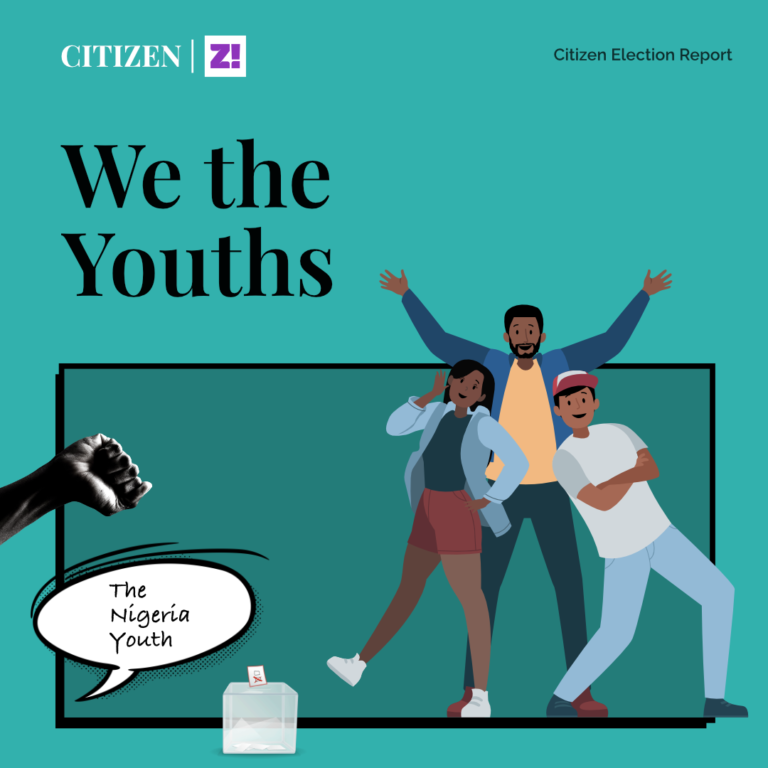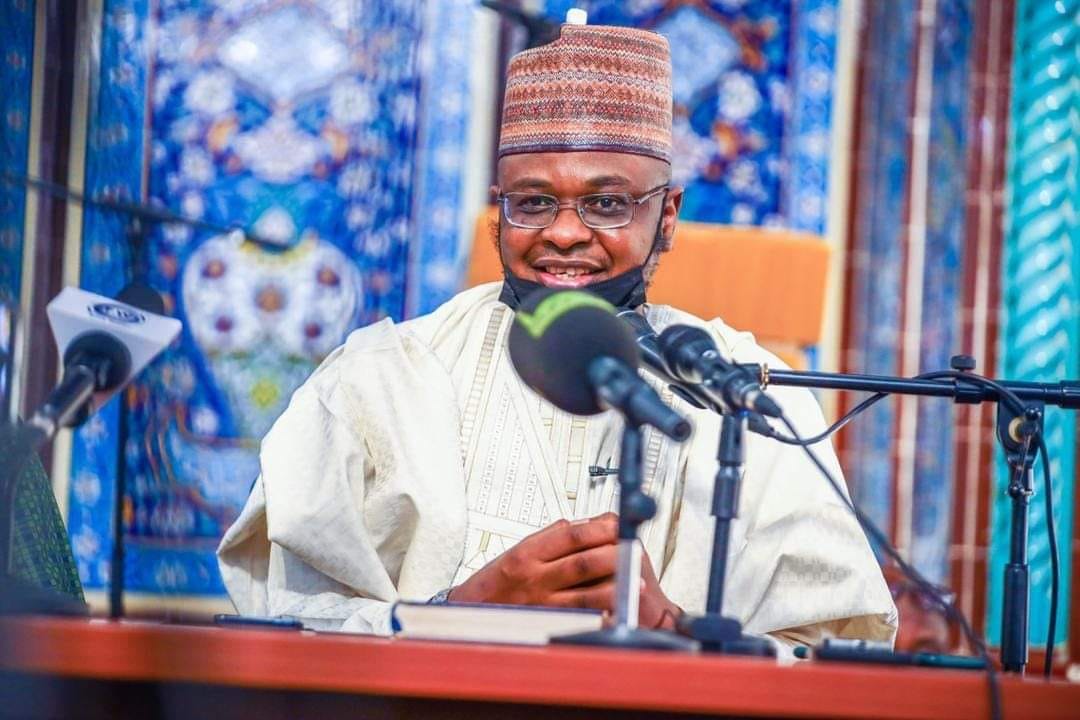Founded in 1977, Nigerian Television Authority (NTA)’s slogan is “You Can’t Beat the Reach.” But NTA has been failing to beat its reach.
With President Tinubu’s new administration, NTA is experiencing a surprising revival in many people’s eyes. Notably, there has been a remarkable increase in its social media activity, establishing it as a trusted source for current government activities.

In a significant move as well, NTA recently joined other international media outlets in Saudi Arabia for the annual briefing of the minister for media ahead of the commencement of the 2023 Hajj rituals. NTA was the only Nigerian media platform present at the briefing.
Reclaiming its position as the government’s “mouthpiece,” NTA’s newfound activeness and engagement on social media in sharing updates, announcements, and breaking news have impressed many Nigerians. Some view NTA’s resurgence as a source of inspiration, believing that if NTA can “rise again”, dormant aspects of their lives can also experience a renaissance.
What did NTA look like before now?
During the early years of Nigeria’s democracy, NTA was respectable. Back then, in the absence of social media, tuning in to NTA’s network news at 9 p.m. was the primary way for Nigerians to stay informed.
NTA’s news presenters, like Eugenia Abu, Ronke Ayuba, Abike Dabiri, and Cyril Stober, became household names and gained popularity among viewers.
Melony Ishola, a TV producer and presenter who has worked in the past with NTA as a freelancer, says, “The important thing is that at the time, when NTA existed before we had the digital media space, NTA monopolised the market. NTA was about the biggest and only, except, of course, AIT and a few others here and there, regionally and locally in states, were able to pull their weights, but as far as national media is concerned, it’s almost always been the Nigerian Television Authority.”
NTA has a network of over 100 stations across Nigeria, with its headquarters in Abuja. Among its branches, NTA International serves as the international station. NTA has expanded its reach in the digital age by introducing eight additional digital channels: NTA News24, NTA Sports, NTA Entertainment, NTA Knowledge, NTA Hausa, NTA Yoruba, NTA Igbo, and NTA Parliament. These digital channels enable NTA to cater to a wider audience beyond traditional terrestrial broadcasting.
Ishola considers this new digital revolution for NTA an opportunity to compete with emerging and innovative broadcast platforms like Arise TV and Channels, which have ears and eyes for the younger population of Nigerians whose major access to information exists on the internet, specifically social media.
Emeka Mba, former Director General of Nigeria’s National Broadcasting Commission, told Citizen that NTA initially lost relevance and market share because the government news network “lost its voice and became even more entrenched as a government mouthpiece rather than a public broadcaster.” He added that “its programming content became less relevant to the growing demographic of younger viewers.”
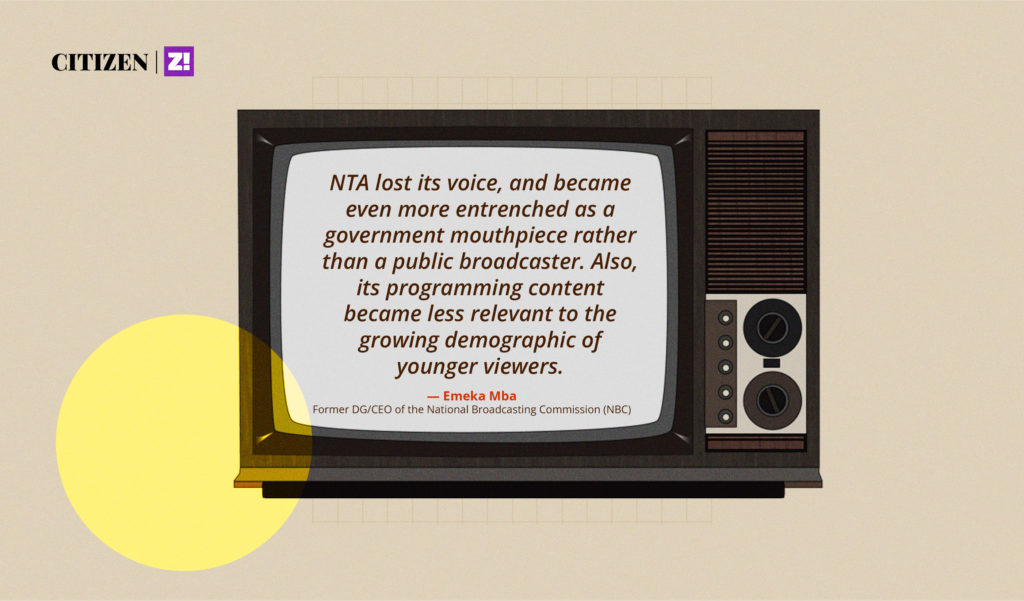
The “mouthpiece” is poorly funded
Both Ishola and Mba agree that one key reason we are seeing NTA active and creating new content formats or styles like a documentary on Nigeria’s political evolution and Tinubu’s rise to power
With all these developments, Mba sees it as “a very wise strategic move to ensure ownership of narratives and, even more importantly, in the age of so much noise and clutter on social media,” to create a one-stop shop for disseminating approved government information.
Ishola also shares, “You will realise that NTA is poorly managed and poorly funded. And one of the biggest reasons for poor production, poor outputs, and poor perception would be that they were poorly funded.”
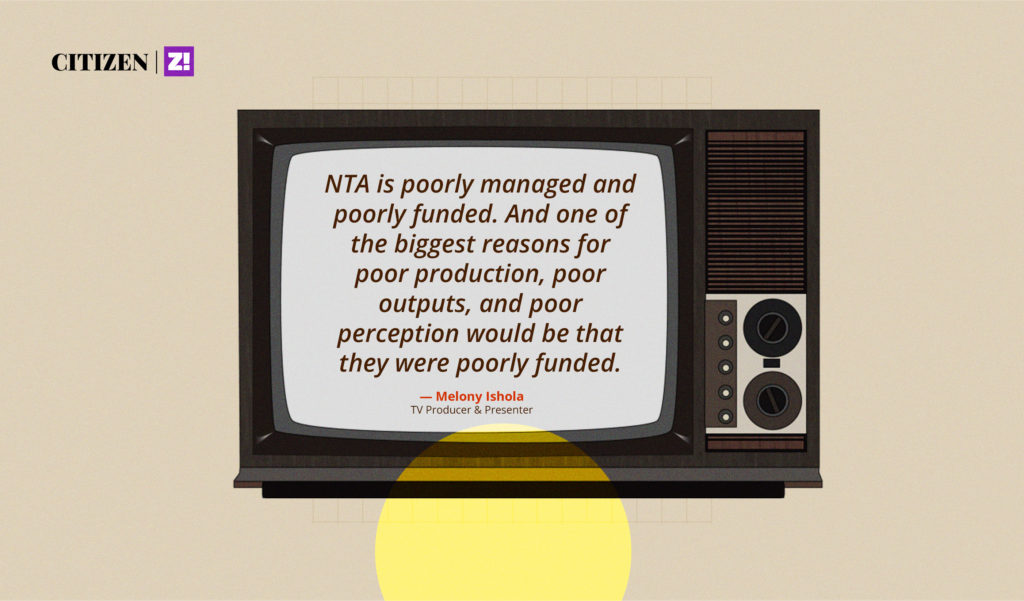
However, according to Ishola, one of the “major minuses” of NTA would be its role in shaping the perception of citizens about the government. In the last few decades, she says, “There has been an issue of whether or not we could trust their news, but with the fact that they have access to privileged information and whatnot, it means that most of the news we’re going to be hearing from them will be real and true.” Adding further, “We can now begin to debate the motive. And you know how it’s reported, especially if we think it’s more patronising than upholding the tenets and principles of journalism.”
Download the Citizen Election Report: Navigating Nigeria’s Political Journey
While some people continue to praise NTA for its information dissemination as Nigeria began to shape its democracy and the government’s strategic role in enthroning democracy in Nigeria through the NTA, Mba says he can’t “justifiably” agree. “However, if we were to be charitable, during the [Olusegun Obasanjo] years of 1999 to 2007, NTA played a more active role in pushing government narratives than any other administration afterwards,” he shares with Citizen.
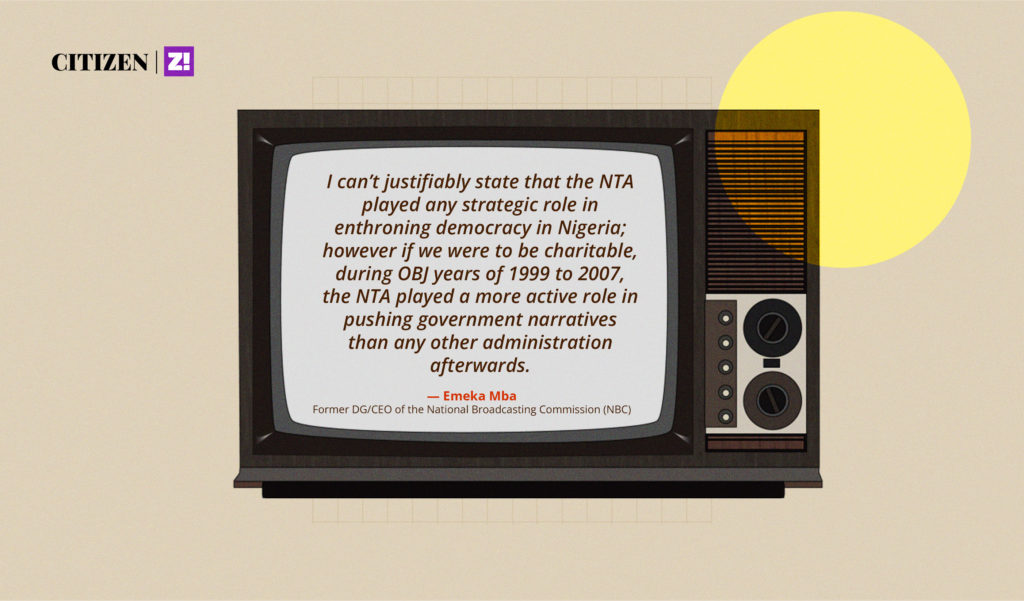
Is Tinubu the Tsunami?
Mba, who had served for two and a half years as the DG/CEO of Nigeria’s broadcasting regulator, told us that “at the start of every new administration, it is the norm to see officials scurrying hurriedly to serve and please the incoming government as a sign of loyalty and lobby to keep their jobs or get better appointments.”
With Tinubu winning a controversial election and being lauded by some for waking NTA from the dead, and all agencies trying to impress and contribute to the new government’s vision, Mba says, “This is expected. Nothing new.”
NTA’s visible accomplishments shouldn’t be solely attributed to Tinubu; credit should also be given to the current NTA Director-General, Salihu Abdulhamid Dembos, who assumed office in 2022. We should consider that Dembos has maintained a reputation that has mostly not been tarnished alongside that of the previous administration, and this has contributed to NTA’s recent spotlight.

On the other hand, many Nigerian media platforms and news producers hold reservations against Tinubu. During his presidential campaign, he criticised them, ignored media invitations and debates, and opted for interviews on international platforms. However, some believe that Tinubu now sees NTA as a new communication channel and recognises the importance of utilising authoritative government channels, despite owning his own media businesses.
Discussing Tinubu’s relationship with the media, Mba, who now runs Afia TV, an indigenous TV channel, states, “If anything, his investment in media such as TVC and the Nation newspaper, as well as the indirect support/influence of many media organisations in Nigeria, doesn’t suggest a man who has disdain for local media.” He believes that Tinubu understands the power of the media and expects him to utilise local channels more effectively in shaping positive narratives for his administration and political agenda.
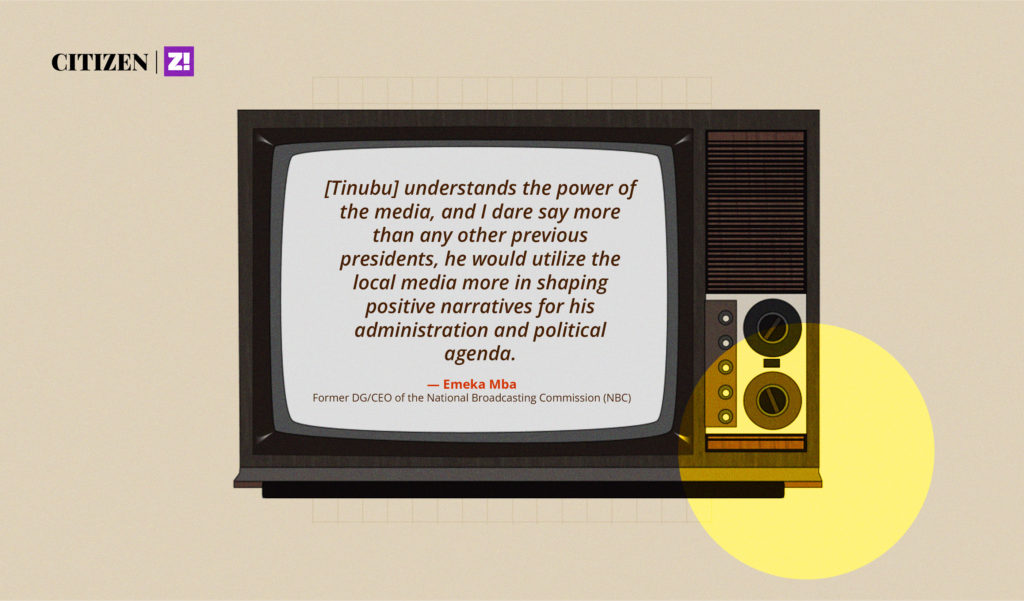
While providing insights into the future of NTA, Mba forecasts, “Beyond the expected knee-jerk reactions from NTA towards any new incoming administration, if nothing is done to reposition NTA and structurally and appropriately redefine its role, the organisation would fall back to its [former] position,” adding strongly, “NTA would become even less relevant to the majority of the Nigerian audience and simply become a press release agency!”


